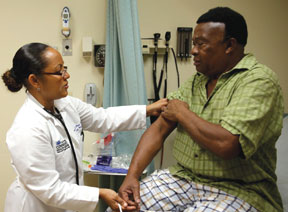
 Study: Florida facing critical shortage of physician specialists through 2025
Study: Florida facing critical shortage of physician specialists through 2025
To meet future health care needs, the Teaching Hospital Council of Florida and the Safety Net Hospital Alliance of Florida seek to expand graduate medical education programs
FORT LAUDERDLAE, FL — As the population continues to grow, change and age, Florida will face a critical short-age of physicians over the next 10 years unless more medical residency training positions are created, the state’s top teaching hospitals announced recently.
While Florida has known for some time about its shortage of doctors, a first-ever study of physician supply and demand commissioned by the Teaching Hospital Council of Florida and the Safety Net Hospital Alliance of Florida found the shortage will grow to 7,000 physician specialists by 2025. This short-fall spans 19 specialties, with the largest areas of need in psychiatry, general surgery, rheumatology, and thoracic surgery.
“Florida has fallen behind in training enough physicians to meet our citizens’ growing need for quality health care,’’ said Steven Sonenreich, chairman of the Teaching Hospital Council of Florida and president and chief executive officer of Mount Sinai Medical Center in Miami. “This study provides a roadmap of the demand for physicians and can serve as a benchmark for Florida’s long-term planning for graduate medical residency training programs.’’
Among states nationwide, Florida ranks near the bottom in the number of residency training slots relative to its population. As a result, Florida would need to create and fill 13,568 residency positions to fully re-solve the physician shortage by 2025. That equates to about 1,360 new residency slots a year for the next decade.
The study showed Florida will face a 19 percent shortfall of physician specialists needed in 2025, compared with an overall 7 percent shortage of physicians. Shortfalls will exist to varying degrees across all regions, with the Panhandle and Southwest Florida having the most severe shortages of doctors in endocrinology, rheumatology, hematology and other non-primary care areas.
Ultimately, creating additional medical residency slots will allow more opportunities for our medical school graduates to stay and practice in Florida, a secondary component of the study concludes. In a sampling of more than 16,600 active physicians, the study found that where medical school graduates conducted their residencies played a crucial role in where they chose to practice. Eighty- one percent of doctors who completed their medical school and residency training in Florida ended up staying. Unfortunately, Florida is losing two-thirds of its medical school graduates to out-of-state residency programs.
“We need to continue to invest in and expand the outstanding residency training programs in Florida to meet the needs of our citizens,” said Dr. Michael Good, dean of the University of Florida College of Medicine. “This report helps us focus our efforts in the areas of greatest need. We need to increase the number of high quality residency training positions in our teaching hospitals and health systems that are available to graduates of the medical schools in Florida, and that attract the top graduates from across the country to Florida residencies, making it more likely for them to stay in Florida after graduation and join our physician workforce.”
Gov. Rick Scott made closing the gap between physician supply and demand a priority in 2013 by proposing $80 million in recurring funds for a new Medicaid residency program, saying it was important to create jobs in fields where demand will remain high. In his 2015-16 budget package, Governor Scott is proposing to increase graduate medical education funding by another $7.5 million annually.
The study validates the importance of expanding the state’s commitment, particularly for specialty fields with doctor shortages. Teaching hospital officials advocate offering financial incentives to hospitals that create and retain slots in specialties with shortages.
The study was conducted by IHS Global for the Safety Net Hospital Alliance of Florida and the Teaching Hospital Council of Florida, whose seven member hospitals last year trained 3,392 medical residents in 268 programs accounting for 66 percent of Florida’s graduate medical education programs. The Teaching Hospital Council is part of the Safety Net Hospital Alliance of Florida, an association of 14 teaching, public and children’s hospitals providing specialized medical care and training for future doctors.


Be the first to comment